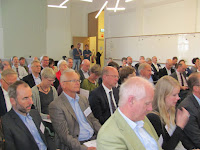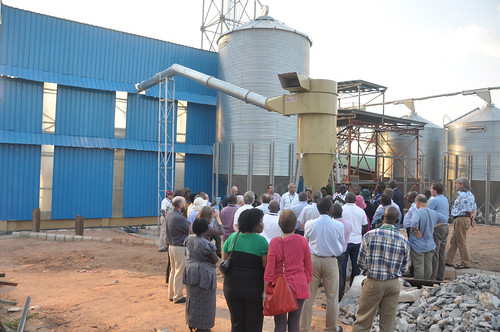
21 September 2015. The Hague. This workshop was co-organised by the Netherlands Ministries of Foreign and Economic Affairs, CGIAR Consortium, World Agroforestry Center (ICRAF), The Dutch Sustainable Trade Initiative (IDH), the Netherlands Development Organisation (SNV) and the Food and Business Knowledge Platform
Objectives of the workshop
- The workshop was designed to enable the private sector and its partners and CGIAR research leaders to engage more meaningfully through:
- Sharing best practices from companies and researchers that inspire and create insight;
- Identifying what the CGIAR needs to bring research and value chain actors more often, more effective and more efficiently, leading to clarity on follow-up;
- Creating a shared understanding around role, position and opportunities for researchers and private sector in public-private sector research partnerships (When do you engage?, What’s in it for me?, What do you miss if you don’t?);
- Clarifying how to shape such partnerships and what it means for development of the new research programs;
- Creating a model for future exchange of best practices.


On the Food & Business Knowledge Platform (F&BKP) website, you can find the complete report, including links to PowerPoint slides and several videos of presentations, speeches, the Dragons Den, and the MoU Signing Ceremony.
Extract presentations: Open Space meeting
PPP in the dairy sector in Zambia. Research and learning on agro-finance
PPP in the dairy sector in Zambia. Research and learning on agro-finance
- A case was presented on the PPP between the Ministry of Foreign Affairs, Rabobank, Zanaco (Zambia) and Rabo International Advisory Services (RIAS).
- These partners, together with the Dairy Association of Zambia (DAZ) and the local dairy processors (a.o. teh Italian PAMALAT), support the development of the dairy sector in Zambia.
- The partnership focuses not only on smallholder farmers but also on emerging entrepreneurial farmers and cooperatives.
PAEPARD video interview with Howard Shapiro of Mars, Inc USA.
The importance on mycotoxin research for the private sector
- Why is the issue of mycotoxin contamination so important?
- How critical is mycotoxin contamination for Mars Inc.?
- Why do you expect from research and development funders?
- Why did the development community not take it up?
- Do we need a pre-harvest or post-harvest intervention?
- Are attitudes changing?
 |
| IITA Board and Management visit IITA Business Incubation Platform (BIP). IITA BIP comprises of Aflasafe, Nodumax and Goseed factories. |
- The goal of the BIP aflasafe plant and laboratories are to develop cheaper, more effective formulations and manufacturing methods for a product which is combating the deadly aflatoxins found in major staple crops in Africa. The plant is compatible with African farming and business models and can easily be transferred to the private sector. The aflasafe plant is also busy manufacturing the urgently needed product to answer increasing requests from all over the continent. On the day of the visit, the plant was about to produce 8 tons of aflasafe to be air-shipped to Kenya in the evening. The plant can produce up to 40 tons of aflasafe a day but the BIP’s main goal is to get interested parties to invest in plant construction and laboratories all over Africa. More plants and reference laboratories are expected to be built, as the aflatoxin strains are different in each region; they need to be identified before the right aflasafe product can be developed and manufactured. “The many existing requests from countries such as Kenya, Nigeria, Zambia, or Senegal prove that the BIP has developed a business opportunity that improves food safety and might help save many lives in Africa,” said Kaptoge.
- NoduMax is a new legume inoculant for soybean that was recently developed at BIP with the award- winning N2Africa Project. Each package of NoduMax costs about $1.03 to produce and, with manufacturer’s and retailers’ inputs, is expected to be sold for about $2.60, sufficient to inoculate 10 to 20 kg of soybean seeds. The product compares favorably to inoculants produced in other countries where product quality is closely regulated. Product development and efficacy testing continues, and the first packages of NoduMax intended for sale are now being produced. The registration of the product for commercial distribution in Nigeria is under way and the first peak production run is just starting as 16 tons of the soybean inoculant are to be produced by April 2015.
- GoSeed is charged with the production and marketing of quality breeder and foundation seeds/planting materials of IITA mandate crops to private seed companies for production, distribution, and sale of quality certified seeds/planting materials to farmers. Awareness and use of quality seeds/planting materials of improved IITA maize, cowpea, soybean, and cassava varieties especially by smallholder farmers will expedite the improvement of their yields, livelihoods, and food and income security. GoSeed activities in 2014 were primarily focused on setting the stage for the full-scale production of breeder and foundation seeds in 2015.
- AgriServe supports IITA’s strategic objectives by providing advisory services and technical backstopping for planning, development, and implementation of start-up agribusiness opportunities, and linking these services to innovative investment.
Within the F&BKP an inventory study on the relation between the reduction of food wastage and the improvement of food security has been conducted. It is recommended that future research and policy, aimed at increasing food security in low- and middle-income countries, should not focus specifically on the reduction of wastage only. It should rather focus on integral context specific programmes to improve the effectiveness of value chains or food systems of which reducing food wastage could be part.
This research (PDF) initiated by the Rural Finance working group of NpM, coordinated by ICCO Terrafina Microfinance and carried out in cooperation with AgriProFocus and the Wageningen UR, aimed to investigated the bottlenecks that exist to finance smallholder farmers. The research provides insight into how food production systems work and how they can be strengthened with improved financial services. The success factors of 14 projects in four African countries – Ethiopia, Mali, Uganda and Rwanda – have been analysed. In addition to specific financing mechanisms, the cooperation between financial institutions, producer organizations and investors has been examined and specific risk mitigation strategies have been investigated. The research report shows that linking financial institutions and producer organizations together offers new finance opportunities because risks are reduced.
Given the large size of the report (74 pages), there is also a summary report available. To access this version, click here. (17 pages)

No comments:
Post a Comment